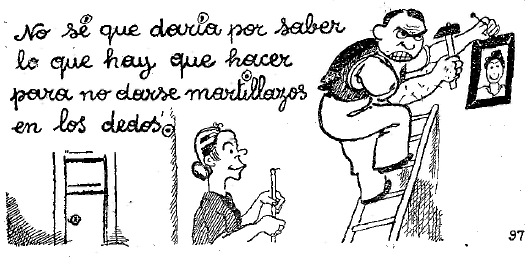
| Языки :: Испанский |
| Аудио |
 |
|
|
289 |
Español |
Spanish |
|
Lección Noventa y siete (97) |
||
| Chistes | Jokes. | |
| 1 |
¿Qué le ha pasado al negro? (1). — Que le han abierto la cabeza. |
— What has happened to the negro? — [That] they have cracked [opened] his head. |
| 2 |
¡Vaya!... ¡que se la cosan!... ¡que le den unos puntos (2)!...
— Sí... pero es que no tenemos más que hilo blanco. |
By Jove! Let them sew it up, let them make two stitches (to it). — Yes but [it is that] we have only white thread! |
| 3 | Una barca en que iban dos negros volcó y uno de ellos llegó nadando a la orilla. | A boat in which were [went] two negroes upset and one of them reached the shore swimming. |
| 4 | ¿Qué haces? le preguntaron (3) ¿ no salvas al compañero? | What do you do, they asked him, you don't save your companion? |
| 5 | Primero me había de salvar a mí, ahora que estoy salvo, le voy a salvar a él. | First I had to save [at] myself; now that I am saved, I am going to save [at] him. |
| 6 |
No sé que daría por saber lo que hay que hacer para no darse martillazos (4) en los dedo |
I don't know what I should give to know what one has to do not to give oneself hammer-strokes on one's fingers? |
| 7 | Muy sencillo : agarre (5) usted el martillo con las dos manos... | Very simple : seize the hammer with both hands. |
| 8 |
¿Qué opina usted de Juanito (6)? — Que es medio idiota (7). |
What do you think of Johnny? — That he is half silly. |
| 9 |
— Pues se quiere casar conmigo. — Entonces es idiota del todo (8). |
Well he wants to marry me. — Then he is quite silly. |
| EJERCICIOS | EXERCISE : | |
| En el estanco. | At the tobacconist's shop. | |
| 1 | Caballero, ¿me puede usted decir dónde encontraré un estanco cerca de aquí? | Sir, could you tell me where I shall find a tobacconist's near here? |
| 2 |
Con mucho gusto; no lo tiene usted muy lejos : sigue usted en la misma dirección, luego toma la primera bocacalle a la derecha y a los veinte pasos ha de encontrarlo... |
With pleasure; you have one [it] not very far; you go on in the same direction, then you take the first street [-entrance] on the right and after twenty paces you are going to find it. |
| 3 |
Señorita, ¿me hace el favor de una cajetilla de
pitillos? — ¿ De cuánto, señor? — De peseta. |
Miss will you give me [do you do the favour] a packet of cigarettes? — At what price [of how much], sir? — [At] one peseta. |
| 4 | A ese precio los hay de dos clases, unos emboquillados y otros no. | At that price there are two kinds, the ones with stiff [cardboard] ends and the others without [no], |
| 5 | Como ya tengo boquilla tomaré éstos. | — As I have a cigarette-holder, I shall take these. |
| 6 |
¿Qué precio tienen esos puros? — Son de seis reales cada uno. |
(At) what price are [have] those cigars? — They are [at] 6 reals each. |
| 7 |
¿ Me quiere enseñar algunas pitilleras de las que tiene
expuestas en el escaparate? — Aquí tengo las mismas, señor, escoja usted. |
Will you show me a few cigarette-cases, [of] those you have in display
[keep displayed] in the window? — I have the same here, sir; your choice. |
| 7 |
¿Qué vale ésta de plata? — Veinte pesetas. — ¿Y la de cuero? — Diez pesetas, señor. — Bueno, para hoy me contentaré con ésta. |
How much is the silver one? — 20 p. — And the leather one? — 10 p. — Good; for to-day I shall be content with this one. |
| 8 |
¿Manda usted otra cosa, señor? — Sí, unas postales, con vistas del pueblo y de la región. — Aquí tiene Vd. un álbum, señor, con los precios marcados para cada serie. |
[Do you order] anything more, sir? — Yes, postcards with views of the town and region. — Here is an album, sir, with the price marked for each series. |
| NOTES. | |
| 1 |
If, on one hand, Spanish very seldom uses subject pronouns, you may have
noticed, on the other hand, it very often uses redundantly the object
pronouns le, la, lo : What happened to him, the negro? — Le he dicho a tu amigo que... I told it to your friend that.. — Remember : lo sé todo, I know everything, liter. : I know it everything. Dios lo ve todo, God sees [it] everything. |
| 2 |
Dar unos puntos, to make stitches; another example of
dar (to give) meaning to do. Cf. : dar un paseo, dar una vuelta (a walk, a stroll). |
| 3 |
Le preguntaron, lit. : they asked him. As in English, the 3rd person plural is used for an impersonal subject (like one, or people, or somebody). Dicen, they say; cuentan que, they tell that... |
| 4 | Martillazo, a stroke of the hammer, from martillo, with suffix -azo meaning a stroke. |
| 5 | Agarrar, to grasp, grip, derived from garra, claw, talon is more expressive than coger, to seize (with motion or effort), and than tomar, to take (without effort). |
| 6 |
Juanito, dimin. of Juan, John. The diminutive, which, as you must have noticed, is very frequently used in Sp., does not always imply smallness or youth; very often, it is simply endearing, when you speak of somebody or something with sympathy, affection or familiarity. It is the case here for Juanito, this good friend, John. |
| 7 |
Medio idiota, half silly. Medio, when used before adjectives or participles is invariable : esta mujer es medio loca, this woman is half mad. With a verb, you must say a medias : No me gusta hacer las cosas a medias, I don't like to do things by halves. |
| 8 | Del todo, quite, completely, wholly. |
|
Bocacalle means only the entrance of a street. Crossroads is : una encrucijada. — The real is worth 25 centimes. — A few more smokers (fumadores) articles : la pipa, the pipe; el cenicero, ash-tray; el mechero, or encendedor, the lighter. |
